初中英语八大时态精选PPT
合集下载
八大时态 PPT课件
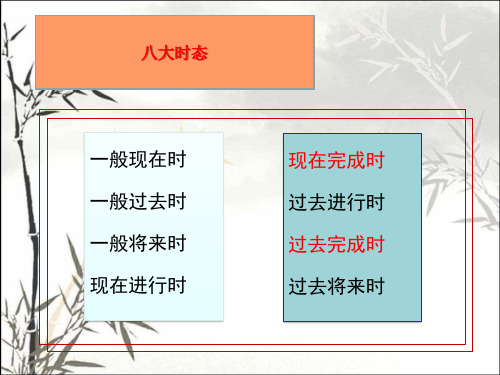
八大时态
一般现在时 一般过去时
现在完成时
过去进行时 过去完成时 过去将来时
一般将来时
现在进行时
一般现在时
表示经常性或习惯性的动作
表示现在的状态
表示普遍事实或真理
一般现在时结构
当主语不是第三人称单数时: 肯定句 :主语+动词原形+其它 否定句 :主语+don't+动词原形+其它 一般疑问句: Do+主语+动词原形+其它
I leave home for school at 7:00 every morning. She/He/It gets up at 6:00 every day.
一般过去时
表示过去某个时间发生的动作或存在的状态,长和表 示过去的时间状语连用 例如:yesterday,last night,in+过去的年份, two days ago,before,the age of,the day before yesterday等。 也表示过去经常或反复发生的动作,长和表示频度的 时间状语连用 例如:often,always,once a week
2)This is the… that…结构,that从句要用现在完成时. This is the best film that I've (ever) seen. 这是我看过的最好的电影。 This is the first time (that) I've heard him sing. 这是我第一次听他唱歌。
用于现在完成时的句型
1)It is the first / second time…. that…结构中的从句部分,用现在完 成时。 It is the first time that I have visited the city. It was the third time that the boy had been late.
一般现在时 一般过去时
现在完成时
过去进行时 过去完成时 过去将来时
一般将来时
现在进行时
一般现在时
表示经常性或习惯性的动作
表示现在的状态
表示普遍事实或真理
一般现在时结构
当主语不是第三人称单数时: 肯定句 :主语+动词原形+其它 否定句 :主语+don't+动词原形+其它 一般疑问句: Do+主语+动词原形+其它
I leave home for school at 7:00 every morning. She/He/It gets up at 6:00 every day.
一般过去时
表示过去某个时间发生的动作或存在的状态,长和表 示过去的时间状语连用 例如:yesterday,last night,in+过去的年份, two days ago,before,the age of,the day before yesterday等。 也表示过去经常或反复发生的动作,长和表示频度的 时间状语连用 例如:often,always,once a week
2)This is the… that…结构,that从句要用现在完成时. This is the best film that I've (ever) seen. 这是我看过的最好的电影。 This is the first time (that) I've heard him sing. 这是我第一次听他唱歌。
用于现在完成时的句型
1)It is the first / second time…. that…结构中的从句部分,用现在完 成时。 It is the first time that I have visited the city. It was the third time that the boy had been late.
英语时态8种基本时态讲解.ppt课件

4)动词过去式变化规则。 a)一般情况下的词加-ed. work---worked call----called b)以不发音的字母e结尾的单词直接加-d . live----lived change----changed smoke----smoked die----died graduate----graduated drive----drove
8.过去完成时 表示动作发生在过去某一时间之前已经完成的动作或状态, 强调“过去的过去”, 常与 by the time, by the end of…,before , by 等引导时间的状语连用。
基本结构 主语+ had + 动词过去分词 + 其他成分 When I got to the cinema yesterday the film had begun already. He had learned English before he came here.
现在完成时与一般过去时的区别: 1)现在完成时侧重于对现在的影响;而一般过去时侧重于某一动作发生在过去某个时间或某段时间。即现在完成时侧重于现在的结果,而一般过去时侧重于动作发生的时间。例如:
I have seen the film. 我看过这部电影。(现在我仍记得电影的内容) I saw the film three days ago. 三天前我看了这部电影。(强调是三天前,而不是别的什么时候看的电影)
be going to含有“打算,准备”的意思,而will则没有这个意思, She is going to lend us her book. He will be here in half an hour.
be about to+V.原形(意为马上做某事,在时间上指最近的将来) I am about to leave school. 不能与表示时间的副词连用。 They are about to set out.(√) They are about to set,变y为i加-ed. study----studied carry----carried cry----cried try----tried d)以元音字母+y结尾的单词直接加-ed. play----played stay----stayed
8.过去完成时 表示动作发生在过去某一时间之前已经完成的动作或状态, 强调“过去的过去”, 常与 by the time, by the end of…,before , by 等引导时间的状语连用。
基本结构 主语+ had + 动词过去分词 + 其他成分 When I got to the cinema yesterday the film had begun already. He had learned English before he came here.
现在完成时与一般过去时的区别: 1)现在完成时侧重于对现在的影响;而一般过去时侧重于某一动作发生在过去某个时间或某段时间。即现在完成时侧重于现在的结果,而一般过去时侧重于动作发生的时间。例如:
I have seen the film. 我看过这部电影。(现在我仍记得电影的内容) I saw the film three days ago. 三天前我看了这部电影。(强调是三天前,而不是别的什么时候看的电影)
be going to含有“打算,准备”的意思,而will则没有这个意思, She is going to lend us her book. He will be here in half an hour.
be about to+V.原形(意为马上做某事,在时间上指最近的将来) I am about to leave school. 不能与表示时间的副词连用。 They are about to set out.(√) They are about to set,变y为i加-ed. study----studied carry----carried cry----cried try----tried d)以元音字母+y结尾的单词直接加-ed. play----played stay----stayed
初中英语八大时态-讲解ppt课件
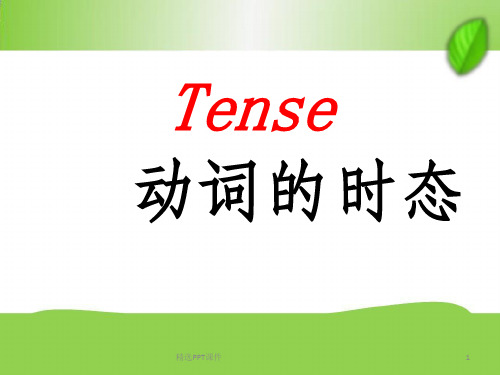
例题
Li Ming didn’t understand what American people
said,_____?
A.couldn’t he
B.could he
C.didn’t he
精选PPT课件 D.did he
8
三、现在进行时
1.用法:
A.现刻动作:目前正在发生的动作。
B.现阶段动作:目前一个时期一直在进行的 动作,此刻不一定在进行。
I have worked.
I had worked.
精选PPT课件
5
•各种时态的用法
精选PPT课件
6
一、一般现在时
1.用法:A.现在经常性的动作或状态 B.客观事实和真理。
2.标志词:always, usually,often, sometimes, never, every day /week /month/year/…
例句:I am working.
例句:I was working.
精选PPT课件
3
一般将来时, 将 will加原型。 来 过去将来时,
would加原型。
I will work.
I would work.
精选PPT课件
4
完 成
现在完成时, have/has加过分。 过去完成时,
时 had 加过分。
tomorrow,in three days,in (the)
future,next week/month/term…,
from now on 精选PPT课件
14
4.shall/will/be going to之间的区别:
shall往往用于第一人称疑问句, will可用于任何人称。
八大时态讲解(共26张PPT)

He is going to buy her some flowers.
0 一般过去将来时:
He was sixty-eight. In two years he would be seventy.
I knew you would agree.
0 现在英进行语时的: 动词时态(进行) What are you doing?
算;
如:I am going to listen to music. (我打算听音乐) will /shall 表示未事先思考或为计划过的意图
如:It will be Christmas soon .(很快就圣诞节了)
4. 现在进行时态( The Present Continuous Tense )
5、我们离开广州六年了。
We have left Guangzhou for 6 years . ×
We have been away from Guangzhou for 6
years .
3.常见句型
1) 主句(现在完成时)+since 从句(一般过去时).
2) It is +一段时间+ since 从句(一般过去时).
has gone to
He said had seen this morning, …ago, etc
that he _________the film many 如果明天不下雨,我们将去野营。
He has borrowed the pen for three days .
times. 现在进行时态( The Present Continuous Tense )
was /were going to +动词原形
0 一般过去将来时:
He was sixty-eight. In two years he would be seventy.
I knew you would agree.
0 现在英进行语时的: 动词时态(进行) What are you doing?
算;
如:I am going to listen to music. (我打算听音乐) will /shall 表示未事先思考或为计划过的意图
如:It will be Christmas soon .(很快就圣诞节了)
4. 现在进行时态( The Present Continuous Tense )
5、我们离开广州六年了。
We have left Guangzhou for 6 years . ×
We have been away from Guangzhou for 6
years .
3.常见句型
1) 主句(现在完成时)+since 从句(一般过去时).
2) It is +一段时间+ since 从句(一般过去时).
has gone to
He said had seen this morning, …ago, etc
that he _________the film many 如果明天不下雨,我们将去野营。
He has borrowed the pen for three days .
times. 现在进行时态( The Present Continuous Tense )
was /were going to +动词原形
初中英语八大时态课件

典型例句
I have just finished my homework. 我刚刚完成了 我的作业。
She hasn’t seen the film yet. 她还没有看过这部电影 。
Have you ever been to Europe? 你曾经去过欧洲吗 ?
They haven’t had any success so far. 他们到目前 为止还没有任何成功。
典型例句
总结词:用来说明一般过去时的用法和形式。
详细描述:以下是一些典型例句,说明一般过 去时的用法和形式
I played tennis yesterday.(我昨天打网球了。)
They visited the museum last week.(他们 上周参观了博物馆。)
We went to the party last night.(我们昨晚 参加了聚会。)
用法
主要用于描述现在正在发生的事情,也可以用于描述最近一段时间内发生的事情 ,强调现在的情况或状态。
动词形式
基本形式
be动词+动词的现在分词
肯定式
am/is/are+动词的现在分词
否定式
am/is/are+not+动词的现在分词
疑问式
把be动词提前到句首,其他部分按 顺序排列
典型例句
I am studying English now.(我现在正在学习英 语。)
总结词
表示过去发生的动作对现在产生的影响或结果
详细描述
现在完成时是指动作发生在过去,但这个动作对现在产生了 一定的影响或结果。这个时态常与“已经”、“刚刚”等词 连用,强调的是现在的情况或结果。
动词形式
英语八大时态PPT课件(详细版)
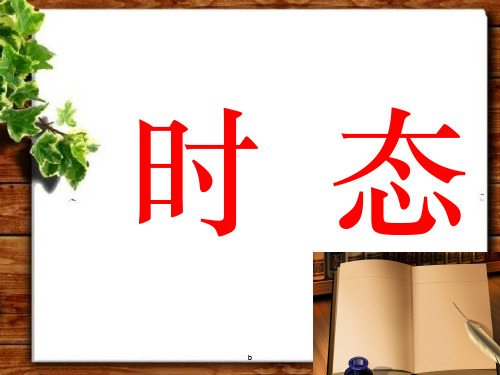
b
15
He is a lazy man . He ____the dirty jeans every day.(2014 )
A. always wears B. always wearing C. always to wear D. is always wearing
You will know the truth after you ___him.(2013) A. see B. will see C. are seeing D.to see
b
16
三、一般过去时
1、构成 一般过去时用动词的过
去式表示。除系动词be的过去式 有人称和数的变化外,其他动词 的过去式无人称和数的变化。
b
17
2、用法
※表示过去已经发生的动作,现在 已经结束,常与相应的过去时间状 语连用。 Tom fell ill last night , and he had to stay at home.
【翻译】
我今年20岁,住在北京。 I am twenty years old this year , and I live in Beijing.
火车将在一个小时后(in an hour)出发(set off)。 The train sets off in an hour.
她每天都走路上学。 She walks to school every day. 或:She goes to school on foot every day.
If it doesn’t rain tomorrow,we’ll
go shopping.
பைடு நூலகம்
b
6
常与一般现在时连用的时间状语有:
often 经常
英语八大时态PPT课件(详细版)
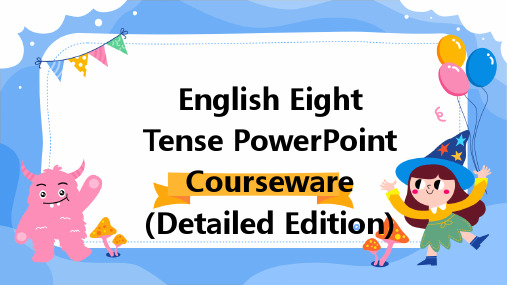
come)
The perfect tense is formed by combining the presentation
particles of the verb with have or has (e.g., he has gone, she has come)
The Composition of the Eight Tenses in English
03
Examples
I have studied, They have played, He has written
Present simple tense
Definition
The present simple tense is used to express an action that is verbal, generic, or not emphasizing time
VS
Tense can be classified into two categories: simple tense and complex tense Simple tense includes present, past, and future tense, while complex tense includes the perfect, the superior, the future perfect, and the conditional perfect tense
Conditional Perfect Tense
It is used to express actions or events that would have been completed in the past if a condition had been met
The perfect tense is formed by combining the presentation
particles of the verb with have or has (e.g., he has gone, she has come)
The Composition of the Eight Tenses in English
03
Examples
I have studied, They have played, He has written
Present simple tense
Definition
The present simple tense is used to express an action that is verbal, generic, or not emphasizing time
VS
Tense can be classified into two categories: simple tense and complex tense Simple tense includes present, past, and future tense, while complex tense includes the perfect, the superior, the future perfect, and the conditional perfect tense
Conditional Perfect Tense
It is used to express actions or events that would have been completed in the past if a condition had been met
初中英语八种时态归纳PPT
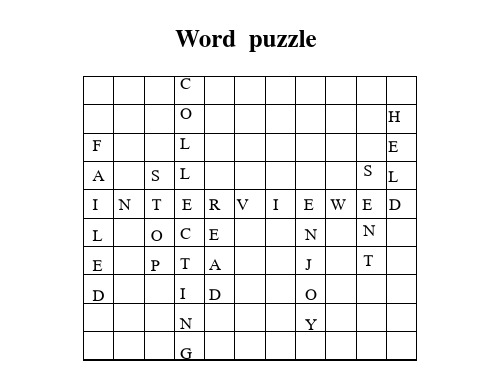
10. About 400 years ago, Galileo proved that the earth travels (travel) around the sun.
Part B 语态
Active Voice
Passive Voice
主动语态
1. Many people speak English.
At the party.
--- I _l_ik_e___ your jacket, Tim. How long _h_a_v_e_y_o_u__h_a_d__ it?
Oh…er… I __b_o_u_g_h_t__it last week. W__o_u_l_d_y_o_u__li_k_e_ to dance, Becky? ---Phew. It’s __h_o_t__ here. --- Put your jacket on the chair. You ____n_e_e_d_n’wt orry. It’ll be ok. ---That’s _b_e_tt_e_r __.
8. Mr. Green and his wife had lived (live) in London for a few years before they came (come) to work in China in 2001.
9. He said he w__o_u_ld__n_o_t_s_p_e_a(k not,speak) at the meeting the next day.
4. Hurry! Your classmates _a_r_e_w__a_it_i_n_g(wait) for you in the classroom..
1. This is the third time you _h_a_v_e__b_e_e_n__(be) here.
Part B 语态
Active Voice
Passive Voice
主动语态
1. Many people speak English.
At the party.
--- I _l_ik_e___ your jacket, Tim. How long _h_a_v_e_y_o_u__h_a_d__ it?
Oh…er… I __b_o_u_g_h_t__it last week. W__o_u_l_d_y_o_u__li_k_e_ to dance, Becky? ---Phew. It’s __h_o_t__ here. --- Put your jacket on the chair. You ____n_e_e_d_n’wt orry. It’ll be ok. ---That’s _b_e_tt_e_r __.
8. Mr. Green and his wife had lived (live) in London for a few years before they came (come) to work in China in 2001.
9. He said he w__o_u_ld__n_o_t_s_p_e_a(k not,speak) at the meeting the next day.
4. Hurry! Your classmates _a_r_e_w__a_it_i_n_g(wait) for you in the classroom..
1. This is the third time you _h_a_v_e__b_e_e_n__(be) here.
- 1、下载文档前请自行甄别文档内容的完整性,平台不提供额外的编辑、内容补充、找答案等附加服务。
- 2、"仅部分预览"的文档,不可在线预览部分如存在完整性等问题,可反馈申请退款(可完整预览的文档不适用该条件!)。
- 3、如文档侵犯您的权益,请联系客服反馈,我们会尽快为您处理(人工客服工作时间:9:00-18:30)。
I often go there.
Do you often go there ?
You like the music.
Do you like the music.?
He goes to work by bus . Does he go to work by bus ?
We /You/They like it.
2) She usually goes to school at 7 o’clock
every morning.
ppt课件.
4
动词第三人称单数形式
·在动词后+s
· 在以s,x,ch,sh,o结尾的动词+es · 以辅音字母+y结尾的动词,
先变y 为i,再加es
·特殊 have-has 等
ቤተ መጻሕፍቲ ባይዱ
ppt课件.
She is a doctor
She isn’t a doctor.
We are friends.
We aren’t friends.
is not=isn’t
are not=aren’t
ppt课件.
8
2. 当 主 语 是 单 数 第 三 人 称 时 , 它与助动词Does有关,但是 动词谓语一定要恢复为原形。 当主语是其他人称时,它与 助动词Do有关。
• 结构 : 1、主语+动词原形+其他 • Eg. • I have a meeting on Sundays . • They visit their parents once a month.
ppt课件.
3
注: 主语(三单)+ 动词(第三人称单数形式)+其他
Eg.
1) She likes it very much.
Review of Tenses 初中英语八大时态
ppt课件.
1
教学重、难点
1、The Simple Present Tense 一般现在时态
ppt课件.
2
一般现在时
• 表示经常发生的动作或存在的状态 • 常与every day , on Sundays,
sometimes , often ,usually ,always,等连 用
III一般疑问句
概念:用 yes 或 no 来回答的疑问句叫做一般疑问句。 一般疑问句句首的第一个词一般读得比较重。
1.对于be 动词,疑问句要求把be 提前, 第一人称变成第二人称。
I am a teacher. Are you a teacher?
You are a worker.
疑 问
Are you a worker?
I like English. She likes it very much. We go to work by bike.
否定句
ppt课件.
I don’t like English.
She doesn’t like it very much.
We don’t go to work by
bike.
9
He is a student. 句 Is he a student?
We are friends.
Are you friends?
ppt课件.
10
2.对于实意动词,疑问句要求是:当主 语是他(he),她(she),它(it)时,句子前 面加does,并把动词恢复原形;当主语 是其他人称时,句前加do ,第一人称 (I/we) 换第二人称(you)。
ppt课件.
13
用所给动词的正确形式及助动词填空
1. We often __p_la_y_ (play) in the playground.
2. He _g_et_s_ (get) up at six o’clock. 3. _D_o_ you b_r_u_s_h (brush) your teeth every morning? 4. What d_o_e_she usually_d_o_ (do) after school? 5. Danny_s_t_ud_i_e_s (study) English, Chinese, Maths, Science and Art at school. 6. Mike sometimes _g_o_es__(go) to the park with his sister. 7. She w_a_t_ch_e_s (watch) TV with his parents every evening. 8.D__oe_s_ Mike _r_ea_d_(read) English every day?
ppt课件.
6
一般现在时否定式
be + not don’t do / doesn’t do
ppt课件.
7
II 一般现在时的否定式
1.Be 动词的否定式: be + not
I am a teacher.
I’m not a teacher
You are a worker 否定句 You aren’t a worker
Do you do your homework after school ?
ppt课件.
12
把下列句子改为否定句
1.My father has an egg for breakfast . My father doesn’t have an egg for breakfast .
2.Li Lei does his homework after school.
5
写出下列动词的第三人称单数形式
help s guess es flyies makes leaves fix es swim s know s
play s
closes
go es studyies gets read s bring s watches
carryies do es wash es visit s exercise s enjoy s jump s hhaavse
Do you/they like it?
ppt课件.
11
exercise
把下列句子改为一般疑问句
1.He has a meeting on Sundays . Does he have a meeting on Sundays ?
2.He goes to school at seven in the morning .
Does he go to school at seven in the morning? 3.My father and mother go out for lunch on Sundays.
Do your father and mother go out for lunch on Sundays ? 4.We do our homework after school.
Li Lei doesn’t do his homework after school.
3.We do our homework at home.
We don’t do our homework at home .
4.They have a meeting every morning .
They don’t have a meeting every morning .
